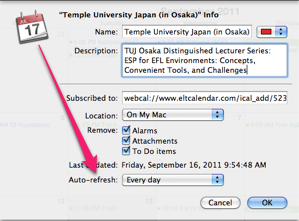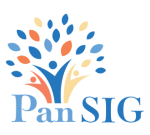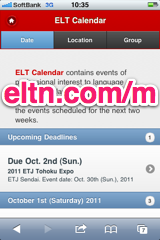Fukuoka JALT:
�The Temple University and Fukuoka JALT 2nd Annual Applied Linguistics Colloquium (day 2 of 2)
Date: Sunday, July 15th, 2007 Time: 11:30 AM - 4:00 PM
Speaker: Arita, Baldwin, Carter, Cochrane, Connor, Daugherty, DeLint, Farmer, Fryer, Fukuhara, Harland, Holster, Lake, Mineura, Praver, Sonda, Sorensen, Stewart, Tokunaga, Tsuda
Description:
This is the second day of the 2-day Temple University and Fukuoka JALT 2nd Annual Applied Linguistics Colloquium. The speaker for day 1 will be James Dean Brown.
July 15 Time, Presentations and Descriptions
11:30-11:55
Pragmatic Markers in English, J. Lake
There are many differences between spoken and written language. One feature of spoken language is the frequent use of pragmatic markers. Although often used in speaking, they are not often taught. This is a work in progress, this presentation will review some of the literature on pragmatic markers and discuss how these pragmatic markers can be taught, tested, and researched for future studies.
12:00-12:25
English Speaking Class Action Research Report, Nozomu Sonda
The present researcher examines his own English speaking class designed to improve conversational skills of high beginners. The learners enjoy speaking English and improve fluency. However, their English has a number of errors. I will discuss what activities work and what errors may need to be treated.
Expectations and Misunderstandings of Critics of English Education in Japan: A Shinsho book guide for language teachers in Japan, Akiko Tsuda
This paper focuses on shinsho books which have possible influence on English education in Japan, and the reasons English language teachers should read them. The author selected thirteen books published from 2000 and 2006, overviews the tendency of shinsho writers' profile and frequently discussed topics, and lists problems they have caused.
12:30-12:55
Computer Assisted Extensive Reading, Jeff Stewart
Recently, Extensive Reading has become popular at Japanese universities. Graded readers, which limit the vocabulary and grammatical forms included in texts, are used to ensure that students have access to material that can read easily and enjoyably. However, new technology now makes authentic text more accessible to language learners. A computer program called Backword gives students instant translations of words held under the cursor, greatly increasing the speed and ease with which learners can read authentic text. The speaker details suggestions for adding computer-assisted extensive reading into a curriculum
Learning Strategy Instruction in a High School Conversation Class : Can it Lead to More Effective Learning and Increased Motivation? Robert Cochrane
A report on a study in progress involving the introduction of learning strategies into a weekly high school conversation course. Learning strategies rather than communication strategies are the presented to 8 of 16 classes to investigate whether there is an effect on the test scores in students' general English courses.
1:00-1:25
The usage of please in ESL textbooks, Yukiko Arita
The purpose of this study is to compare the usage of the adverb please in English as a second language (ESL) textbooks with pragmatic analysis research. This presentation will overview functional aspects and syntactic features of please and reveal that these functions and features are still insufficiently taken into consideration in ESL textbooks.
English Around Us, Suzy Connor
There's an abundance of written English in Fukuoka, from basic street signs to interesting advertisements and t-shirts. Not everyone notices, but enough do to warrant addressing it in class. This presentation will demonstrate students' awareness of such English and how teachers can use this in class.
1:30-1:55
Classroom Management: class rules, attendance cards and teacher's homepage, Miki Tokunaga
With low-level and unmotivated students, classroom management strategies are essential. In this presentation, the presenter will share some methods on how to: 1) make sure the students follow the class rules, 2) find out how students are doing in the class, and 3) keep students informed of homework and tests.
Writing with a Purpose: Learning to Write through the Production of a Magazine, Cindy Daugherty & Kathleen Fukuhara
In this presentation, we will explain the advantages and logistics of including a magazine project as a major component of an ESL writing course. This project gives students opportunities to work with their classmates in writing with the meaningful purpose of communicating their own ideas to an audience of readers. A magazine, as a single class-wide project, promotes peer teaching and learning. At the same time, its format can include various styles and genres such that individual preferences can be accommodated.
2:00-2:25
Creating Customized Vocabulary Activities, Trevor Holster
Vocabulary is essential to language learning. This presentation will look at an easy and practical way of identifying problematic vocabulary in texts and creating review activities targeted at individual classes or students using a scanner and free or inexpensive software.
Comparison of Responses to Unsolicited Information Between Japanese and Overseas Passengers: Research on Intercultural Communication or Miscommunication? Atsuko Mineura
I think travelers favorably accept unsolicited information offered by local people when some criteria are met. This research explores what criteria should be met, and if there are any differences in responses between Japanese and non-Japanese travelers.
2:30-2:55
Issues In Testing Speaking, Darcy DeLint & Trevor Holster
Standardized tests typically do not directly test language production, so teachers were surveyed to assess the feasibility of utilizing shared speaking tests. Teachers held incompatible views, making shared tests inadvisable, but there was evidence that informal coordination may give benefits with a much smaller investment of resources.
Using the Internet as a Means of Evaluation, Aaron Sorensen
The presenter will share his experiences with using email and the internet as a means of evaluation. While using email to collect homework may not be new, the presenter will suggest how teachers can simplify this process. In addition, he will offer exercises and useful websites for EFL learners.
3:00-3:25
Authentic Listening and Relevance, Stephen Farmer
This paper presents the results of a study initiated in an attempt to address the issue of poor motivation amongst low-level students at a university in Japan. The study shows that authentic materials can be motivating factors for even low-level students and that available course materials are failing to appeal to the interests of Japanese university students.
Teacher Motivation in the Language Learning Environment, Max Praver & Quint Baldwin
One of the most overlooked areas of second language acquisition is the motivation level of the teacher. In this presentation, we will identify intrinsic and extrinsic motivation, and then discuss the connection between teacher motivation and various job characteristics such as autonomy, institutional support, and relationships. Finally, based on initial data gathered in the research, we will present a number of practical ways that institutions can motivate their teachers and increase the actual quality of teaching.
3:30-3:55
Listening to Learn: Principles for enabling listening comprehension, Peter Carter & Luke Fryer
This presentation will describe and critique current methodologies in L2 listening, and then suggest an alternative approach that treats listening comprehension as a process and not a product. Principles for an effective listening course will be detailed, and participants will then see strategies and tasks that promote real learning demonstrated.
The Role of Volunteer Work Camps in Promoting Genuine Communication, Jane Harland
This presentation will discuss the role of volunteer work camps in promoting genuine communication. The study will focus on a two-week international volunteer camp held at Tokyo Port Wild Bird Park in August 2006. Participants included able-bodied and less able-bodied participants from over 10 countries, and English was used as the official language. The presenter is currently exploring the possibility of weekend camps in Kyushu.
Organization: Fukuoka Chapter of the Japan Association for Language Teaching (Fukuoka JALT)
Cost: free
Venue: Fukuoka Jo Gakuin Tenjin Satellite Campus (9F), Tenjin 2-8-38, Chuo-ku, Fukuoka-shi map
Location: Fukuoka City, Fukuoka Prefecture, Japan
![]() Add this to iCal
Add this to iCal
![]() (Need help?)
(Need help?)
![]() Add to Outlook
Add to Outlook
![]() (Need help?)
(Need help?)
You can add this event to your iCal calendar.
- Click on the iCal icon. Your iCal software will start.
- Click 'Subscribe':

- Under 'Auto Refresh', select 'Every day' in case the the basic details change:

You can add this event to your Microsoft Outlook calendar.
- Click on the MS Outlook icon.
- See what happens.
- Tell us what happens. I don't have MS Outlook on a Windows computer, so I can't test it.
- If you click on the icon and nothing happens, do this:
- Right-click on the icon and save the file.
- According to Microsoft's support page, in Outlook's File menu, you should click Import and Export.
- Click to select Import an iCalendar or vCalendar file (*.vcs), and then click Next.
- Click to select the vCalendar file you've just saved, and then click Open.
Contact Fukuoka JALT
Website: www.fukuokajalt.org
Email QR Code:






